Series 8 - listen to the show
The Binary Times - Series 8 Episode 9
Its our 100th and final episode.
Sun 25 October, 2020
Timeline companion
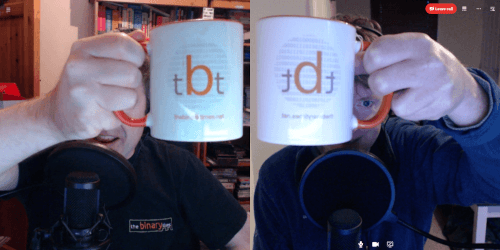
00:24 Wayne Welcomes us to Series 8 Episode 9, the 100th and final episode of the Binary Times. It's windy and overcast in Bristol, and much the same in Kilkishen, with storms through the night and rain, rain, rain. Mark thinks it's fitting that they're winding up the Binary Times the same time that the clocks are being wound back.
02:48 Wayne asks Mark what does he think about reaching 100 episodes. The guys discuss what was so amazing about the Binary Times. The guys are quite proud of what they've managed to achieve, and they're grateful for all their supporters and contributors. They're also looking forward to taking a break and taking stock. Wayne asks their listeners to write in!He's sure that the email inbox will be hopping! The guys discuss their plans for the wind down of the show and putting everything up on the Internet Archive.
14:29 Wayne asks Mark what he's been up to. Mark tells him not an awful lot, but he does want to mention the 240th issue, the 20th anniversary of the Linux Magazine . There are loads of interesting articles and a 20th anniversary DVD which includes all previous issues of Linux Magazine. Mark suggests it's well worth a buy.
Mark also tells us that he's purchased an AT2020 XLR microphone and a Behringer Xenyx Q802USB to make sure he had the best possible sound for the last episode (if not the most prepared show ever...). He explains how all this came about. He also advises not to purchase the Behringer Xenyx Q502USB as the phantom power provided is only 15V when most microphones require 48V and it is just too limited compared to all the other Behringer products.
The conversation changes to how the guys are going to fill their time once the Binary Times is over.
25:15 Wayne tells us about what he's been at. He tells us that he's now back on Lineage OS. His Sony Xperia X still has Ubuntu Touch on it. Wayne tells us why he's moved away from Ubuntu Touch as a daily driver. It was a death by a thousand paper cuts. The guys discuss the pros and cons of open phones and devices.
40:15 As the conversation turns to wanting devices that just works, Mark wants to mention how good Endless OS is. He finds it's a great OS that just works and comes with a lot of preloaded content.
42:21 Wayne tells us about Syncthing, which is a continuous file synchronization program. It synchronizes files between two or more computers in real time, safely protected from prying eyes. Your data is your data alone and you deserve to choose where it is stored, whether it is shared with some third party, and how it's transmitted over the internet. Mark tells us that Syncthing is one of the applications available on the Freedombox.
48:12 Under the Hood - Mark tells us about Terms of Service - Didn't read, a web site that reads the terms of services we're all forced to accept and rates them in terms of how good or bad they are so that we can be more informed as to what we're accepting.
53:56 Wayne's under the Hoods are good ones. His first is that you can sign up for Nexctloud without having to host it yourself from Nextcloud's home page. Wayne also mentions the Nitrokey NextBox as a self hosted NextCloud solution. Wayne also mentions the Nextcloud Ubuntu Appliance for the Raspberry Pi.
A few other things Wayne wants to mention are related to the the release of Ubuntu MATE 20.10. He also mentions the Odroid HC-4 as a good SoC to build a NAS around as it supports two drives. He also mentions Log 2 RAM as a great utility to extend the life of your Raspberry Pi's SD card. As the name suggests, logs are written to RAM rather than to the SD card..
1:00:41 Irish saying of the show is "Slán go fóill, agus go n-éirí an bóthar leat", or goodbye, and may the road rise to meet you!
Thanks to everybody for helping keep the Binary Times going for as long as it did! We've enjoyed our time in the Binary Times, and we hope you did too!
The Binary Times - Series 8 Episode 8
Sat 10 October, 2020
Timeline companion
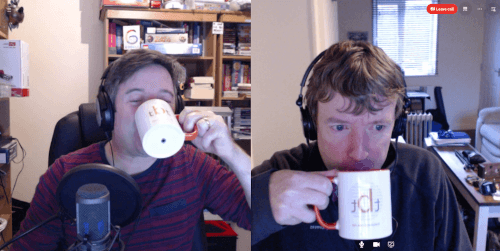
00:24 Wayne welcomes us to Series 8 Episode 8 of the Binary Times. He's talking to us from a pretty still Bristol, while it's only getting bright in Kilkishen which is cloudy and wet. Mark notices that the night temperatures are higher than the day temperatures in Kilkishen that day and this reminds him of of an article he recently read about night time temperatures being disproportionately higher than days. Wayne worries whether the guys will be able to pull a show out of the bag considering they've had so many guests recently.
03:30 Mark tells us he's hardly noticed what's been going on with NPHET with all the fun he's been having with Turris Mox. He's purchased a Turris Shield to go with his Turris Mox Classic and Turris Mox power wifi, he's really gone all in with Turris. He goes on to tell us all about his adventures with the various bits of kit. Despite all the hiccups he's now delighted with his setup.
23:11 Mark goes on to tell us that he's continuing to play around with and enjoy his Volla phone. He also tells us how Volla is looking to hire. He's looking forward to trying out Volla OS.
26:30 Wayne tells us about his adventures with his netgear switch and SFPs. It made Wayne very excited altogether!
29:30 Wayne tells us about the Nextcloud conference and the guys have a chat ranging around the various topics from the conference. The conversation pivots around to trying to get FOSS used in schools and how dominant Microsoft is through out this space.
48:02 Wayne brings it around to a positive story when he tells us about an email we got from a chap called Rick who's involved with Wasta-Linux in Ethiopia. Rick explains why they use Linux. The guys admire what he's doing, it's quite inspiring to see FOSS technology used to empower people.
51:30 Under the Hood - Mark talks about Nitrokey and his inability to use 2FA. Despite this he tells us he's interested in the Nitropad. Wayne's frustration with Mark's inability to use 2FA leads him to threatening a punch and advising Mark he shouldn't use computers. Mark needs to ponder this. Hopefully his pondering will last long enough to allow them to record their 100th episode, since they've made it all the way to 99!
Wayne's Under the Hood is to suggest that you should always 'manage your settings' when the 'We value your Privacy' pop up appears. He also tells us that LibrePlanet 21 are doing a call out for papers.
1:08:34 Irish saying of the show is "Tá mé go maith" or I am good.
Thanks to all our Patrons, and thanks to everyone who's listening, we hope you enjoyed the show.
The Binary Times - Series 8 Episode 7
Sat 26 September, 2020
Timeline companion

00:24 Wayne welcomes us to Series 8 Episode 7 from a sunny calm Bristol. It's much the same in Kilkishen. Wayne introduces their guest, Jos Poortvliet, co-founder and head of marketing at Nextcloud GmbH, the company behind the Nextcloud community. He's a privacy activist and has been active in the open source community for 15 years, in projects like KDE and openSUSE. He lives in Berlin and is very frustrated he can't tell much yet about the announcements at the upcoming conference... but you can all tune in! Unfortunately, it's quite dull outside for Jos, but at least the conversation is quite the opposite!
02:50 Jos tells us that he's quite busy with upcoming releases and the upcoming conference. Wayne notes that the conference is all about Home Office this year. Jos tells us that NextCloud is a remote working organization by nature, so providing a Home Office solution comes naturally also. They've been working hard on improving video conferencing in Talk 9, with lots of bandwidth improvement measures and Jos tells us of many of the improvements in NextCloud 19. The guys talk about user's expectations, and Jos jokes that we are already living in the future, giving GPS and modern CPU design as examples of the complexities involved in delivering tweets. Wayne tells us he's quite happy living 3 years in the past with technologies, though Jos reminds him that means he's still moving as fast, only three years behind. Jos hints at the explosion in technological advances 5G will bring.
16:50 Wayne asks Jos about his role in Nextcloud. Jokingly he tells us he talks a lot while other people work! Nextcloud is building something people need, an ambitious, featureful, collaboration environment that concentrates on the user interface rather than the underlying infrastructure, using an email client without an email server as an example. Ease of use is really important to Nextcloud and they concentrate heavily on providing an integrated user experience to enable that and make them stand apart.
24:15 Wayne asks about the integration of Collabora and OnlyOffice. Jos starts by saying they have just recently integrated Microsoft Office Online Server. He goes on to tell us that whatever they ship as default at the time will be the best integrated solution, which is currently Collabora. Jos tells us they like to support user choice, and the conference will include talks around third party app integration, including a talk on BigBlueButton. Nextcloud can be a solution to help prevent app sprawl.
31:25 Wayne asks Jos if Nextcloud instances are in many schools. Jos lists off the schools, including schools in the city of Bern and the Technical University of Berlin as examples. Jos talks about the power of monopoly and the fear of the unknown that stops people using Free and Open Source Software rather than stable user interfaces, and cites the Ribbon interface as an example of accepted change. Once the Technical University of Berlin adopted Nextcloud, many others followed. Jos goes on to describe the downfalls for organizations when using Open Source and Jos thinks organizations need to educate themselves and vendors need to help with that education and describes support contracts as a kind of insurance. Support contracts need to be with companies that include developers of the software.
44:05 The conversation turns to the most popular applications on Nextcloud. The default apps are among the most popular of course, and Talk is quite popular, along withText. Community apps including bookmarks and audio are mentioned as popular.
47:03 Wayne brings the conversation around to the much anticipated conference, and Jos tells us about the plan. The conference will take place in Berlin and the Saturday talks are going to be recorded and streamed live. The talks on Sunday will be prerecorded though there will be a live Q&A while the talk is happening, which is pretty cool.
50:35 Under the Hood - Jos gives us a great Under the Hood for KDE - Kmail has a follow up reminder that he finds useful and he also likes the direction email clients are taking, especially the features offered by the HEY email client.
Mark's Under the Hoods is Cory Doctorow's Kickstarter for Attack Surface, the third of the Little Brother books. He can't remember his second one so he passes over to Wayne. It's been a long week for Mark...
Wayne's Under the Hoods are firstly to tell us that OTA 13 has been released for Ubuntu Touch. Wayne uses lsblk -d -o name,rota. He finally mentions the DIY Maker School by Make from Humble Bundle.
58:17 Saying of the show - Mark was inspired by Jos and Michael Franti & Spearhead's latest album "Work Hard and Be Nice" for this saying, and it is this: "Bad Shit Happens, but Good Shit Happens Too!"
Mark thanks Amiga Ireland for their recent mention of the Binary Times on their podcast.
The Binary Times - Series 8 Episode 6
Sat 12 September, 2020
Timeline companion

00:24 Wayne welcomes us to Series 8 Episode 6 of the Binary Times Show from a sunny Bristol. Mark tells us it's dull in Kilkishen, but the show won't be! The guys are delighted to welcome Florian Leeber (pronounced Layber), a member of the board of directors in the Ubports foundation and head of infrastructure in personal union. Florian tells us that it's a nice day for a stroll in the park in Vienna today. He's joining us to discuss the Ubports project.
02:43 The discussion starts with Wayne asking Florian what exactly is Ubuntu Touch and why people should take an interest in it. Florian tells us that Ubuntu Touch is a mobile phone operating system and provides us with a brief history of the project. He feels the initial project was probably ahead of its time and Ubuntu can be misunderstood for the direction they try and take Linux, as they were creating a lot of software that wasn't already in existence. As an example, Mir and Unity 8 were created to achieve a snappy mobile desktop environment. Florian points out that these had to be created as they weren't available elsewhere. Mark also points out that Ubuntu's Contributor License Agreementlead to a lack of contributions. Florian can see the necessity in such an agreement. Florian's only criticism is that because the project was largely in house the developers didn't think of external developers all that much and the project was not particularly well documented, while Florian provides some technical examples. He also thinks the approach that the Ubports foundation are taking now with the likes of the PinePhone is more practical towards building a community than the one originally envisaged, and thinks that Purism is making the same mistake as Canonical did with the Librem 5.
Florian goes on to tell us how he became involved in the project. He didn't get involved until 2015 and was surprised he hadn't heard of it previously. He became aware of the porting community and became involved in trying to port a HTC X One. This failed but gave him the opportunity to get to know and be involved in the community. When Canonical announced they were no longer developing Unity 8 and Ubuntu Touch, he came together with others in the community and between them all decided to continue the project. These were fast moving times in the project, as you may well imagine, but it all came together fairly quickly. The original community evolved into today's foundation, while the community continues to grow and there's always more and more to do!
18:08 Wayne asks Florian what are the benefits of using Ubuntu Touch. Florian tells us the main advantage is that the phone doesn't rely on cloud services and it's an independent way of bringing mobility to people to use their phones on the go. The only applications that use cloud services are those that need them, such as NextCloud and Fluffychat. This has the advantage that Ubuntu Touch user's are not being tracked constantly with profiles of their usage being built, unlike Android and iPhone. The guys agree that this is a good reason to use Ubuntu Touch. Florian feels it's about giving people choices, and the ability to do whatever you want with your phone. Wayne imagines a Jimmy Hendrix moment at the end of the show.
24:34 Wayne asks whether Ubuntu Touch is for enthusiasts or everyday users. Florian feels that Ubuntu Touch isn't quite there for everyone at the moment, but it is an important goal that the OS is usable by a mass market audience. This includes reducing the hackability of the phone and preventing users from installing random packages anywhere so that it's possible to employ Over The Air updates successfully. Stability is crucial in a phone.
28:44 Wayne asks about the convergence features of Ubuntu Touch. Hardware is still behind the vision, though things are improving. Florian thinks that Shiftphones may be great convergence devices when they have an HDMI output. Shift is a small German company producing modular, beautiful and sustainable phones and convergent devices. Florian points out that following Android devices isn't ideal due to breakage between versions and devices like PinePhone that don't rely on Android in any way are a better way to go. He goes on to talk about another collaboration they have with Volla and the Volla Phone. He notes that Hallo Welte are investing in helping Ubuntu Touch work on the Volla phone and getting Anbox to work. Open Hardware and Software that is commonly adopted is the future in Florian's eyes, allowing [Big Tech](https://en.wikipedia.org/wiki/Big_Tech) like Facebook to take notice and produce apps for Ubuntu Touch. This prompts Wayne to ask if Ubuntu Touch users really want Facebook, and Florian talks about the pervasiveness of the platform, while also pointing out that privacy by design is integral to Ubuntu Touch. It's difficult to find the right balance that will allow enough people to adopt the platform.
42:58 Mark asks Florian how sustainable is Ubuntu Touch. Florian tells us that the foundation is quite sustainable and goes through the various funding channels they have. He also says to continue to grow they need more employees and where to employ qualified people at reasonable rates is proving an interesting problem
48:38 Mark asks Florian for his opinion on Bruce Perens recent presentation on What Comes After Open Source. Florian thinks it's a good idea, fewer licenses and developers getting paid for their time is a good thing. As with all good ideas, the devil is in the detail, and how to decide who gets what will be the hard part, though worth exploring. Florian questions the security and traceability of today's web development practices. Florian finishes by inviting everyone to try out Ubuntu Touch and also there are plenty of ways to contribute.
58:55 Under the Hood. Thanks to Dave over on the Other Side Podcast Network once again for Mark's Under the Hood, and it is yet another [Humble Bundle], this time the DIY Maker School Bundle.
Florian's Under the Hood is a recommendation to try out Stellarium and Pure Maps from the Open Store on Ubuntu Touch. He also tells us that uNav has a new version coming out soon.
Wayne's Under the Hood is a sane way to look at df -h, and that is 'echo "alias df='df -h -x squashfs -x tmpfs -x devtmpfs'" >> ~/.bash_aliases'
62:45 Saying of the show is kindly provided by Florian and soon to become a favourite of both Wayne and Mark, and that is 'die Technik is a hund' or Technology is a dog!
We hope you enjoy the show as much as we did making it, and thanks to Florian for making this a great one.
The Binary Times - Series 8 Episode 5
Sat 29 August, 2020
Timeline companion
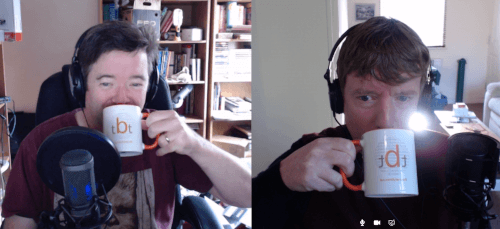
00:24 Wayne introduces Season 8 Episode 5 with the weather. Mark's got a new segment to the show with Old Mok's predictions due to his uncanny wintry prediction.
02:52 Mark tells us he's been grand, what with holidays and trips off to Kerry and the like, though the Kerry trip was cut short due to storm Ellen. He goes on to tell us then that he was trying to use find to move files but wasn't successful and asks the audience for some help.
He goes on to tell us that he used a GIMP feature to create animations. His advice from this is to not try to run an animation preview if the animation preview window is already open as it will crash your entire system.
12:20 Wayne tells us about his electronics tinkering after Mark prompts him to explain what all those pictures were in the Maker's Corner Telegram Channel. Wayne has been playing around with the Wemos D1 mini, a low power micro controller, and tells us about his adventures. He tells us the differences in power use of the Wemos D1 mini compared to the Raspberry Pi, and tells us about Jeff Geerling's article on reducing power in a Raspberry Pi Zero.
30:14 Mark talks a bit about his Turris MOX. He tells us his DNS is now provided by CZNIC. It's not all been plain sailing as he managed to put his Turris MOX into a boot loop that he wasn't able to get out of even when he successfully forced a factory reset. He hasn't flagged this yet. He recommends backing up the SD card so that you can easily get back to a fresh install.
37:23 Mark goes on to tell us that OTA updates of Ubuntu Touch are now available with the Volla Phone. The guys discuss Ubuntu Touch.The conversation takes in Teleports and Telegram and messaging, as well as Apple's shortcomings. As well as banking. Not that banks will be around for much longer.
Wayne goes on to tell us that hes' upgraded his NextCloud instance to 19, and NextCloud Talk to 9. The guys think it's great.
54:24 Under the Hood - Mark's Under the Hood is yet another Humble Bundle, and this one is the Advanced Computer Security and Privacy Bundle.
Wayne's first Under the is mkdir -p, to create all the directories as given. His second one is a link to Awesome Self Hosted, a list of Free Software network services and web applications. Wayne's final one is acpi -i to check the health of a laptop battery.
01:00:34 Irish saying of the show is "Tá sé ag teacht anuas i ndáiríre" - Its really coming down (out there)
We hope you enjoyed the episode as much as we did making it!
The Binary Times - Series 8 Episode 4
Sat 15 August, 2020
Timeline companion
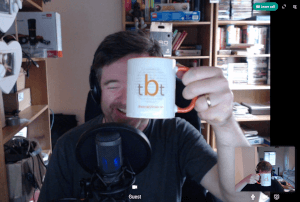
00:24 As a weary soul, Wayne welcomes us to the Series 8 Episode 4. Mark's so weary that he's even forgotten to pull up wttr.in and instead relies on met.ie for his weather report. It must be something to do with the hot weather. However, due to the magic of audio editing you don't get to hear any of the key tapping that Wayne alluded to. The guys discuss hot summers, glowing pale legs exposed to sunlight and grapes exposed to too much heat in France.
The conversation follows this road as the guys discuss climate change and Cory Doctorow's thought provocative article in locus on the subject called Full employment. Cory discounts the fears of people with regard to automation destroying peoples' livelihoods as he thinks we will all be busy remediating the effects of climate change. It will involve unimaginably labor-intensive tasks, like relocating every coastal city in the world kilometers inland
. Mark mentions Indonesia's plan to move Jakarta as an example. The question becomes more one of funding. Mark goes on to quote the article's learned lessons:
The pandemic crisis has taught us two critical things:
1. Blind adherence to government austerity destroys capacity – it doesn’t build it.
2. Sovereign currency issuers do not experience cash shortfalls during crises – they experience capacity shortfalls.
Mark then mentions the David McWilliam's podcast and Angrynomics, a book about the rising tide of anger at inequality in the world and radical new solutions to tackle the inequality, while continuing to talk about Cory Doctorow's article. The discussion takes off from there while the guys try and find a way to solve the world's problems. Mark quotes the last lines of Cory Doctorow's article to give us something to ponder:
Keynes once proposed that we could jump-start an economy by paying half the unemployed people to dig holes and the other half to fill them in. No one’s really tried that experiment, but we did just spend 150 years subsidizing our ancestors to dig hydrocarbons out of the ground. Now we’ll spend 200-300 years subsidizing our descendants to put them back in there.
The guys don't ponder so much as continue their talk on the subject, and there's much to talk about, including World Leaders failing to act, Greece and Turkey squaring up over oil and gas, competing to win, and survival of the fittest vs survival of the most adaptable.
27 minutes into the show, Wayne manages to swing the conversation around to Free Software (in a way) when he discusses work IT spend. He has £900 to spend on three laptops and a tablet. Mark tells Wayne how he was recently able to purchase a Core i5 4590T to replace a G3220 for €30 so that he could install and play with Big Blue Button, a web conferencing system designed for online learning, so his point is computing can be cheap.
32:54 Wayne moves the conversation onto our recent move away from Telegram Chat to Matrix or Element. Mark explains that the main reason they moved over to Matrix was that it is Free and Open Source Software and more in keeping with their philosophy. Wayne is glad they've done it and uses Google as an example of how easy it is just to accept the convenience of it all without questioning the practise. Mark makes the point that it took a while for him to question these things, and Edward Snowden's revelations really made him aware. Mark goes on to say that he's disappointed that Mozilla's and Google's deal will continue but can rationalize it as a tax on Google's dominance. Mark wishes that Mozilla could be properly funded to provide a free internet for us all. Wayne concludes that we should all be out there banging sticks before moving things along to under the hood.
45:01 Under the Hood - Mark's one is a simple one and perfectly acceptable considering what they've just been talking about. For Sysadmin Day he suggests that everyone should go to Admin-magazine's site and give them your email for marketing purposes and free sysadmin tools!
Wayne's first under the hood is a script from one of our listeners, Vicky, that helps her deal with redshift. It goes like this:
#!/bin/bash
#
# Adjust your levels accordingly, redshift options:
# brightness - max value is 1.0
# temperature - normal is 6500, set lower value for less blue
#
# Add a startup item which sets a level, example:
# bash -c "redshift -PO 3900 -b 0.7 ; echo two > $HOME/.red_status.log"
#
# Use keyboard shortcuts to run this script, example:
# Alt + PgDn
# bash -c "$HOME'/Scripts/redshift_keyboard_shortcuts.sh' decrease"
# Alt + PgUp
# bash -c "$HOME'/Scripts/redshift_keyboard_shortcuts.sh' increase"
#
#
keys_pressed="$1"
log_file="$HOME/.red_status.log"
level_status="$("$log_file")"
set_level_four () {redshift -PO 4700 -b 0.9
echo "four" > "$log_file"
}
set_level_three () {
redshift -PO 4700 -b 0.8
echo "three" > "$log_file"
}
set_level_two () {
redshift -PO 3900 -b 0.7
echo "two" > "$log_file"
}
set_level_one () {
redshift -PO 3200 -b 0.6
echo "one" > "$log_file"
}
set_level_zero () {
redshift -PO 2400 -b 0.5
echo "zero" > "$log_file"
}
decrease_level () {
if [[ "$level_status" = "four" ]]; then
set_level_three
elif [[ "$level_status" = "three" ]]; then
set_level_two
elif [[ "$level_status" = "two" ]]; then
set_level_one
elif [[ "$level_status" = "one" ]]; then
set_level_zero
fi
}
increase_level () {
if [[ "$level_status" = "zero" ]]; then
set_level_one
elif [[ "$level_status" = "one" ]]; then
set_level_two
elif [[ "$level_status" = "two" ]]; then
set_level_three
elif [[ "$level_status" = "three" ]]; then
set_level_four
fi
}
if [[ "$keys_pressed" = "decrease" ]]; then
decrease_level
elif [[ "$keys_pressed" = "increase" ]]; then
increase_level
fi
Wayne uses a transparent terminal in MATE and has discovered that
Wayne also talks about barrier, a keyboard and mouse sharing utility
50:12 Irish saying of the show is "Níl áon chat séomra mar do chat séomra féin;
We hope you enjoy the show as much as we did making it!
The Binary Times - Series 8 Episode 3
Wed 05 August, 2020
Timeline companion
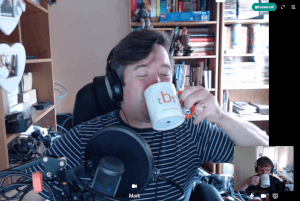
00:24 Wayne welcomes us to Series 8 Episode 3 with a chuckle. The guys are just so happy to be recording the day after Sys Admin Day, and it looks like clear skies all round, though rain is on the way. Mark plans to celebrate Sys Admin Day and the bank holiday weekend with family by foregoing pizza and instead having a barbeque so he hopes wttr.in is accurate and it just stays cloudy for the afternoon. The guys go on to comtemplate how quickly time goes by before discussing what Mark has been at.
03:20 Mark talks about his Volla phone and his beta testing journey with Ubuntu Touch. He also tells us he's finally gotten around to playing around with his Turris Mox. Mark tells us a bit about the Turris project, the Turris Omnia and the Turris Mox. Mark mentions one of the things that got him back to testing the Turris Mox was the recent release of Turris OS 5.0, which is based on OpenWrt 19.07.3. Mark tells us that some of his testing involved listening to the Bugcast while on the Turris Mox wifi. Wayne gives Mark an excuse as to why it took him so long to do anything with his Turris and that turns the conversation around to the tedium of work.
17:02 Wayne tells us he's been up to an awful lot. He's back in touch with Dee, a long lost friend, and they've been catching up on tech and soldering amongst other things. Wayne goes on to talk about home automation. Dementor from the Telegram Channel of the Maker's Corner podcast suggested home assistant requires dedicated hardware for all the extra integrations and the like, so Wayne has installed his home assistant on his Raspberry Pi 4.
On a recommendation from Dee, Wayne has bought 4 Sonoff basics so that he can do some automated switching. Currently he's using one of them to switch on his bed side lamp table at 10.15 pm at night, which gives him and his room a nice little glow inside. Wayne calls out to our American listeners for assistance in purchasing some of these producst, so if you're interested please get in touch. He also likes that these gadgets can be made aware of sunrise and sunset in your area. Wayne is pretty excited about the options the Wyze kit he's hankering after will bring to the table. Wayne's list of useful hints and tips is as follows:
How to Flash Tasmota onto Sonoff Basic - Home Assistant Basics
How to flash custom firmware to a Sonoff Basic
Running Home Assistant with Docker (docker-compose)
HassOS Release-4 build 11 (Stable)
Deprecating Home Assistant Supervised on generic Linux
Wayne goes on to tell us he's been playing with LEDs and ESP32s. Wayne's makery renaissance reminds him of the Rod of Doom and he feels that since electronics are now so cheap and many so open they make for a great hobby. Mark contemplates the true cost of cheap electronics but also thinks Open hardware and software is vital to our futures. Wayne mentions the VPRO Documentary with Shoshana Zuboff on surveillance capitalism as an important watch. Mark recommends the book, as well as Edward Snowden's Permanent Record. The guys have a conversation about surveillance capitalism, ethics, morality, Amish Linux and the importance of the internet.
50:16 Time for Under the Hood - Wayne suggests the use of redshift for late night viewing. Dee sent us in a few beauties: For vi - p3p pastes 3 lines, y3y will copy the next 3 lines. For Android phone, Hotspot & Tethering, enable usb tethering.
Ubuntu MATE Image Viewer (Eye of MATE), pressing F9 in the 20.04 release gives you picture properties in a sidebar view.
Mark shares organisations that he has recently come across that he feels may be useful to people. The first one is Open UK, a UK not for profit organisation committed to develop and sustain UK leadership in Open Technology. The next is OW2, an independent, global, open-source software community, fostering open source projects, claiming to be the only such non-profit open source organisation of EU origin and DNA. He mentions Italo Vignoli's presentation of LibreOffice's 10th Anniversary as a good watch from their OW2's 2020 convention. The final one he wants to mention is Gaia-X, a project which is the cradle of an open, transparent digital ecosystem, where data and services can be made available, collated and shared in an environment of trust.
01:0034 Irish saying of the show is Ceapaim and Ni Ceapaim, or I think or I don't think.
We hope you enjoy the show as much as we did making it!
The Binary Times - Series 8 Episode 2
Sat 18 July, 2020
Timeline companion
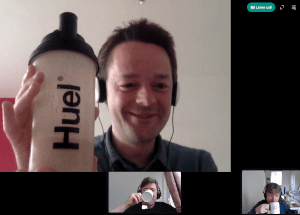
00:24 Wayne welcomes us to Season 8 Episode 2 from a slightly overcast Bristol. Wayne's tongue is refusing to do what its told, leading Wayne to wonder how he can fluff up the intro after so much time. Mark tells us summer is still over in Ireland. Mike Saunders joins us to tell us he has no idea what the weather is like in Munich but the Oktoberfest has been cancelled. Mike tells us its nice to be on the show for his fifth appearance and finds it hard to believe the show is almost four years old. The guys can't believe it either.
03:11 Mark gives us an update on his Volla phone with Ubuntu Touch. The software is still beta but steady progress is being made. Mike asks about the current development of Ubuntu Touch and Mark provides a potted history. Mike is going to try Ubuntu Touch on his Samsung Galaxy S3. Wayne comprehends the bubble we're in. Mike thinks its great the the mobile phone duopoly is being challenged, and Mark lists off some of the mobile phone OSes, like Ubuntu Touch, Volla Phone, Sailfish OS, Postmarket OS, Phosh and the Pinephone. Mark thinks there's a lot to be optimistic about. Mike is upset that MikeOS wasn't mentioned in Mark's list. Mike suggests running qemu and MikeOS on your phone as a project, so Wayne's afternoon is sorted.
Mike tells us he's running FreeBSD these days, but you wouldn't really know it as he's running it on his Nintendo Switch and reminisces about BSD in Microsoft products. Mike also gives a shout out to the developers of the Big Blue Button, a self hosted or integratedweb conferencing solution for online learning. Mark brings up the ECJ ruling as a good reason to switch from proprietary software as a service solutions to solutions like the Big Blue Button, Collabora and NextCloud.
13:07 Wayne tells us he's been on Maker's Corner, another fine Otherside Podcast Network Show. Mark is reminded to tell everyone he appeared on Linux Lads. Wayne goes on to tell us he's been playing with 12V powered electronics and a viktron system he inherited as well as the Grafana graphing software.
16:41 The topic of conversation moves on to The Document Foundation, LibreOffice and the distinction between them, the companies in the LibreOffice ecosystem, and the conundrum of how to fund Free and Open Source Software.
Mike kicks off by commenting on how hard it is to please everyone in software design. He then goes on to tell us that LibreOffice and The Document Foundation have been in the tech news recently with a lot of confusion surrounding the different parts of the project. Mike goes on to explain that The Document Foundation is an independent self-governing meritocratic entity, created by a large group of Free Software advocates, in the form of a charitable Foundation under German law (gemeinnützige rechtsfähige Stiftung des bürgerlichen Rechts) which is now 10 years old. It was set up in the aftermath of Oracle buying Sun and uncertainty around the future of OpenOffice. It's an important distinction to make that The Document Foundation is not a software house, with specific requirements as a non-profit entity. LibreOffice on the other hand is both the software and the project, with hundreds of contributors. In essence, The Document Foundation provides the infrastructure to allow other people to develop LibreOffice. Around this then there are a number of companies formed that contribute code into LibreOffice, so there is good separation between the different parts of the ecosystem to ensure a flourishing Free and Open Source project for all. It's a huge legacy codebase. One of the first projects The Document Foundation undertook was to simplify the build process. Mike goes on to explain the rationale behind the recent personal edition label controversy. He also reminds us of the heartbleed vulnerability as an example of how important it is to provide support to the LibreOffice ecosystem.Mike closes out the discussion with a recognition that Free and Open Source software needs to be funded.
54:52 Under the Hood - Mark's Under the Hood comes from Mike over at the Linux Lads and it is Noise Torch, "an easy to use open source application for Linux with PulseAudio. It creates a virtual microphone that suppresses noise, in any application." Mark decided not to try it before the show to prevent any more audio disasters but plans to install and use it in the future.
Mike's Under the Hood is Huel and Queal, nutritionally complete meal in a drink foods that are good for you, like Guinness only with less alcohol.
Wayne's first Under the Hood comes from Ben in the chat and it is rclone browser, a gui front end for rclone. His second is from another Ben, this time over email, and it is KISS a free and open source launcher for android. Wayne's final one is to mention the latest Maker's Humble Bundle with a whole bunch of useful Maker's books.
01:03:04 And the German "Zungenbrecher": "Schnecken erschrecken, wenn Schnecken an Schnecken schlecken, weil zum Schrecken vieler Schnecken, Schnecken nicht schmecken", or Snails are frightened when snails lick snails because, to frighten many snails, snails do not taste. So there you have, thanks so much to Mike for coming on and taking the time to tell us all about the Document Foundation, LibreOffice and everything else. We hope you enjoy the show as much as we did making it.
The Binary Times - Series 8 Episode 1
Sat 4 July, 2020
Timeline companion
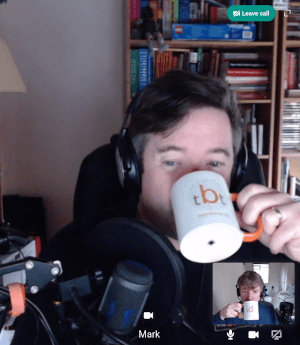
00:24 Wayne welcomes us to the first Episode of Season 8!It's a kind of overcast and cool Bristol, while Mark thinks the summer is over already and reminisces about the earlier great sunny days this year.
03:29 Mark tells us he's actually started making show notes. He also tell us his children arranged for John Romero of Doom fame to send him a Father's Day Message. The fact that they did it and the fact that John Romero obliged kinda blew Mark away and he thanks them all for making Father's Day 2020 so memorable.
Mark goes on to tell us that he is Beta Testing Ubuntu Touch on the Volla phone. Mark reallys likes the look of the device and the specs are great. While the experience is still very Beta, as expected, Mark thinks things are shaping up well for the release later this year.The guys discuss Ubuntu Touch, Wayne Out There's show. The guys discuss whether Ubuntu Touch will ever be a consumer OS and whether that's important, as long as its niche ready and they can help move it along.
25:21 The chat reminds Mark of the latest Humble Bundle, which is Learn Python Programming with PyCharm. The guys go on to discuss another amazing Humble Bundle, the Circuits and Electronics by Morgan and Claypool bundle.
31:05 Wayne tells us that he's got his Nextcloud talk working again after installing a TURN server, and the guys are now recording the show using it. He goes on to talk about Nextcloud and PFSense. He fixed problems with his Nextcloud upgrade by with this guide (the intika entry solved his instance being stuck in maintenance mode) and this guide (see the IanNic solution).
37:55 Wayne goes on to talk about his Raspberry Pis, Ubuntu Server on the Pi and Docker. Following are some of his notes on installing Docker on a Raspberry Pi.
Install docker on a Raspberry Pi
Steps
1. Install Docker
curl -sSL https://get.docker.com | sh
2. Add permission to Pi User to run Docker Commands
sudo usermod -aG docker pi
Reboot here or run the next commands with a sudo
3. Test Docker installation
docker run hello-world
4. IMPORTANT! Install proper dependencies
sudo apt-get install -y libffi-dev libssl-dev
sudo apt-get install -y python3 python3-pip
sudo apt-get remove python-configparser
5. Install Docker Compose
sudo pip3 install docker-compose
Installing docker on the Raspberry Pi
how to start a docker container at boot time.
run systemd service specific user group.
Running a script as another user [docker-compose]
The actions below were taken out to start up the grafana docker container but it needed to be run a user 'pi'.
sudo vi /usr/local/bin/startGrafana.sh
#!/bin/bash
cd /home/pi/Downloads/grafana/
docker-compose up --detach
:wq
chmod +x /usr/local/bin/startGrafana.sh
vi /etc/rc.local
# Add in the line before exit 0
/bin/su -x '/usr/local/bin/startGraf.sh' pi
:wq
reboot.
Great docker introductory video.
44:51 Wayne goes on to tell us he was gifted a Raspberry Pi 4. Eventually he's hoping all his servers will run on Raspberry Pis.
53:05 Under the Hood - Mark's under the hood is Cadmus, a noise suppression utility for Linux.
Wayne's Under the Hoods are the Simple mobile tools website (Thanks Dave!) and pip3 install catt followed by catt cast 'https://www.youtube.com/watch?v=K2eoeC4R5Ak' (thanks Ben!) Wayne also tells us of a DJ Ware video that's worth a watch.
Irish saying of the show is Tá an Samhradh thart
Get your binary times apparel.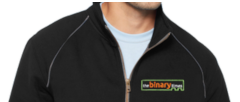
Many thanks to our supporters.
Subscribe to the show
Series 8 Episodes
Episode 9,
Episode 8,
Episode 7,
Episode 6,
Episode 5,
Episode 4,
Episode 3,
Episode 2,
Episode 1
Series 7 Episodes
Series 6 Episodes
Series 5 Episodes
Series 4 Episodes
Series 3 Episodes
Series 2 Episodes
Series 1 Episodes
About The Binary Times
The Binary Times show is created by Mark and Wayne, who just like using linux and open source software and want to spread the word.
GNU/Linux is free and open source and it is an excellent choice of operating system for our ever changing times.
This podcast is released fortnightly.
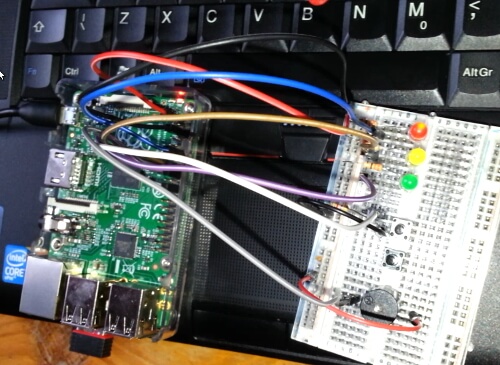
Electronic fun with the Raspberry Pi
This show aspires to touch on various aspects of GNU/Linux, with chat, musings, information, commands to help you get started or to advance within the GNU/Linux environment.
Special thanks
Many thanks to all recent supporters and contributors to The Binary Times Audiocast.
Thanks to Squid/Alex at the Steam Open Source Community for his support and donation.

